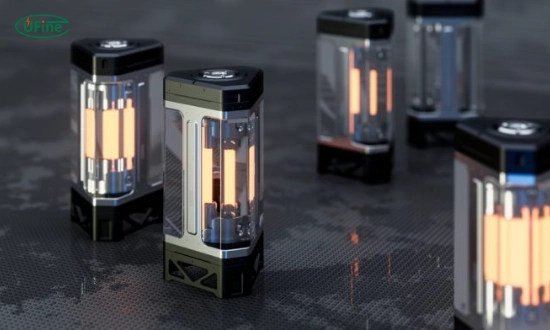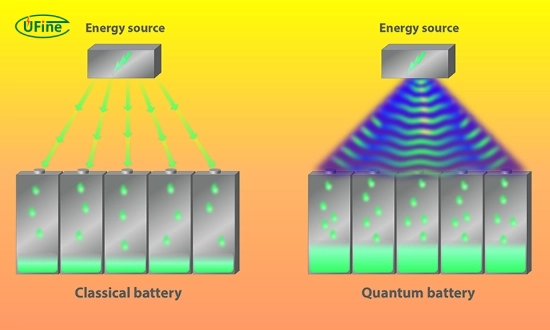
- Part 1. What is a quantum battery?
- Part 2. How do quantum batteries work?
- Part 3. Why are quantum batteries important?
- Part 4. What makes quantum batteries different?
- Part 5. Are quantum batteries real?
- Part 6. What are the benefits of quantum batteries?
- Part 7. What are the challenges of quantum batteries?
- Part 8. How could quantum batteries change the world?
- Part 9. Who is working on quantum batteries?
- Part 10. When will quantum batteries be available?
- Part 11. FAQs about quantum battery
Quantum batteries are a new energy storage technology that uses the principles of quantum mechanics to charge and discharge faster and more efficiently than traditional batteries. This futuristic concept could revolutionize how we store and use energy, offering solutions to many of the issues that current battery technologies face.
In this guide, we’ll explore what quantum batteries are, how they work, and why they might be the next big thing in the energy world. If you’re curious about the future of batteries, you’re in the right place.
Part 1. What is a quantum battery?
A quantum battery is an advanced type of battery that uses quantum physics to store and release energy. Unlike regular batteries that rely on chemical reactions, quantum batteries use quantum states—like superposition and entanglement—to store energy at a microscopic level.
In simple terms, quantum batteries are tiny systems that absorb and give back energy much faster than traditional batteries.
These batteries are still mostly theoretical or in early lab experiments, but their potential is huge.
Part 2. How do quantum batteries work?
Quantum batteries work using the unique rules of quantum mechanics. In particular, they use quantum particles (like electrons or atoms) that can exist in multiple states simultaneously—a concept called superposition.
Here’s a simplified version of how they function:
- When a quantum battery charges, it stores energy in the quantum states of particles.
- These particles can be entangled, meaning they are linked so that a change in one affects the other instantly.
- The energy can be released synchronously and powerfully, making discharge much faster.
- This process is not chemical, avoiding overheating, degradation, and slow charging.
Part 3. Why are quantum batteries important?
Traditional batteries, like lithium-ion, are everywhere—from your phone to electric cars. But they have several problems:
- Slow charging times
- Limited lifespan
- Environmental concerns
- Risk of overheating or fire
Quantum batteries could solve many of these problems by:
- Charging almost instantly
- Lasting much longer
- Being safer
- Possibly working at smaller sizes
If quantum batteries become real-world products, we could see major improvements in energy storage, especially for electric vehicles, renewable energy, and wearable tech.
Part 4. What makes quantum batteries different?
There are a few key differences between quantum batteries and regular batteries:
| Feature | Traditional Battery | Quantum Battery (Theoretical/Experimental) |
|---|---|---|
| Energy Storage | Electrochemical (e.g., Li-ion stores 100–265 Wh/kg) | Quantum states (e.g., superposition, entanglement) |
| Charging Time | 30 minutes to 12 hours, depending on capacity and charger | Theoretical: <1 second via collective quantum charging |
| Efficiency | 80–90% (typical for lithium-ion under ideal conditions) | Theoretical: >95% under ideal quantum coherence |
| Size | Cell size limited by electrodes and safety (e.g., 18×65 mm) | Potentially nanoscale (e.g., quantum dots, 10–50 nm) |
| Lifespan | 500–2,000 cycles (Li-ion); capacity fades over time | Could exceed 10,000 cycles if quantum coherence is preserved |
The most exciting part? Quantum batteries may charge faster with more units, thanks to collective entanglement—a complete reversal of how traditional batteries scale.
Part 5. Are quantum batteries real?
As of 2025, quantum batteries are still in the research phase. Scientists have tested basic versions of them in labs. Some small-scale experiments have shown that it’s possible to charge energy using quantum principles.
For example:
- In 2021, researchers demonstrated a quantum battery prototype using a few quantum qubits.
- These early tests showed that charging speeds can increase with the number of quantum cells.
However, turning these lab models into real, usable products is still challenging. But progress is steady.
Part 6. What are the benefits of quantum batteries?
Let’s break down the biggest advantages of quantum batteries:
- Ultra-fast charging
- Quantum batteries could charge millions of times faster than today’s batteries
- Imagine charging your phone or EV in a few seconds
- Higher energy efficiency
- Because there’s no chemical reaction, less energy is lost as heat
- This means better energy use and less waste
- Longer lifespan
- Without chemical breakdown, quantum batteries could last much longer
- Saving money and reducing waste
- Smaller size
- Quantum systems work on the atomic scale
- Making them perfect for miniaturization
- Ideal for medical implants, wearables, and tiny devices
Part 7. What are the challenges of quantum batteries?
Despite their promise, quantum batteries face serious challenges:
- Quantum systems are fragile. They require special conditions like ultra-low temperatures.
- Scaling up is hard. Making a large quantum battery that works as intended isn’t easy.
- Expensive technology. Current quantum tech is costly and complex.
In short, while the theory is strong, real-world applications are still a few years away.
Part 8. How could quantum batteries change the world?
If scientists succeed, quantum batteries could change everything about how we use energy:
- Electric vehicles (EVs)
- Charge in seconds
- Longer range
- Lighter weight
- Renewable energy
- Store solar or wind energy more efficiently
- Reduce energy loss
- Make grids more stable
- Consumer electronics
- Phones that charge in seconds
- Laptops with longer battery life
- Smaller and lighter devices
- Space and military tech
- Fast, reliable power in extreme environments
The impact could be as big as the invention of electricity itself.
Part 9. Who is working on quantum batteries?
Several universities and companies are researching quantum batteries:
- University of Adelaide (Australia)
- University of Toronto (Canada)
- University of Bologna (Italy)
- IBM and Google are also active in quantum tech, which could lead to battery innovations.
While no company has yet released a commercial quantum battery, interest and investment are growing fast.
Part 10. When will quantum batteries be available?
This is the big question.
Experts estimate that basic quantum batteries could appear in specialized tech within 5–10 years. For consumer-level products, it may take 10–20 years.
Like all new tech, breakthroughs happen faster than expected and face unexpected hurdles.
Part 11. FAQs about quantum battery
What is a quantum battery?
A quantum battery is an energy storage device that uses quantum mechanics instead of chemical reactions to store and release energy.
Are quantum batteries better than lithium-ion?
Yes, in theory. They could charge faster, last longer, and be more efficient. But they are not yet commercially available.
Can quantum batteries be used in phones?
Not yet. But in the future, they might allow phones to charge in seconds and run longer.
Are quantum batteries safe?
In theory, yes. They avoid chemical reactions, which means no risk of explosion or leakage. However, real-world safety tests are still needed.
When will we see quantum batteries in the market?
Most experts believe quantum batteries could appear in niche markets by 2030, and in consumer devices by 2040.
Related Tags:
More Articles

What are Watts and Watt Hours in Battery?
Understand watt vs watt-hour in batteries, how to calculate battery watt hours, and what Wh means for car batteries, devices, and energy storage.
A Complete Guide to the Best Batteries for Flashlights
Compare the best batteries for flashlights, including AA, AAA, 18650, 21700, CR123A. See which battery offers the best brightness, runtime, and reliability.
How Long Do Rechargeable AA Batteries Last?
How long do rechargeable AA batteries last? Compare NiMH and lithium AA lifespan, recharge cycles, key factors, and performance vs alkaline batteries.
How Much Current Can a 9V Battery Really Supply?
Discover how many amps a 9V battery can supply, its actual current output, discharge rate, and capacity for alkaline, lithium, and rechargeable 9V batteries.
12V STD vs 12V AGM: Meaning, Differences, and Which Is Better
Understand what STD and AGM batteries mean, their key differences, and which 12V battery fits your needs best in 2026.




